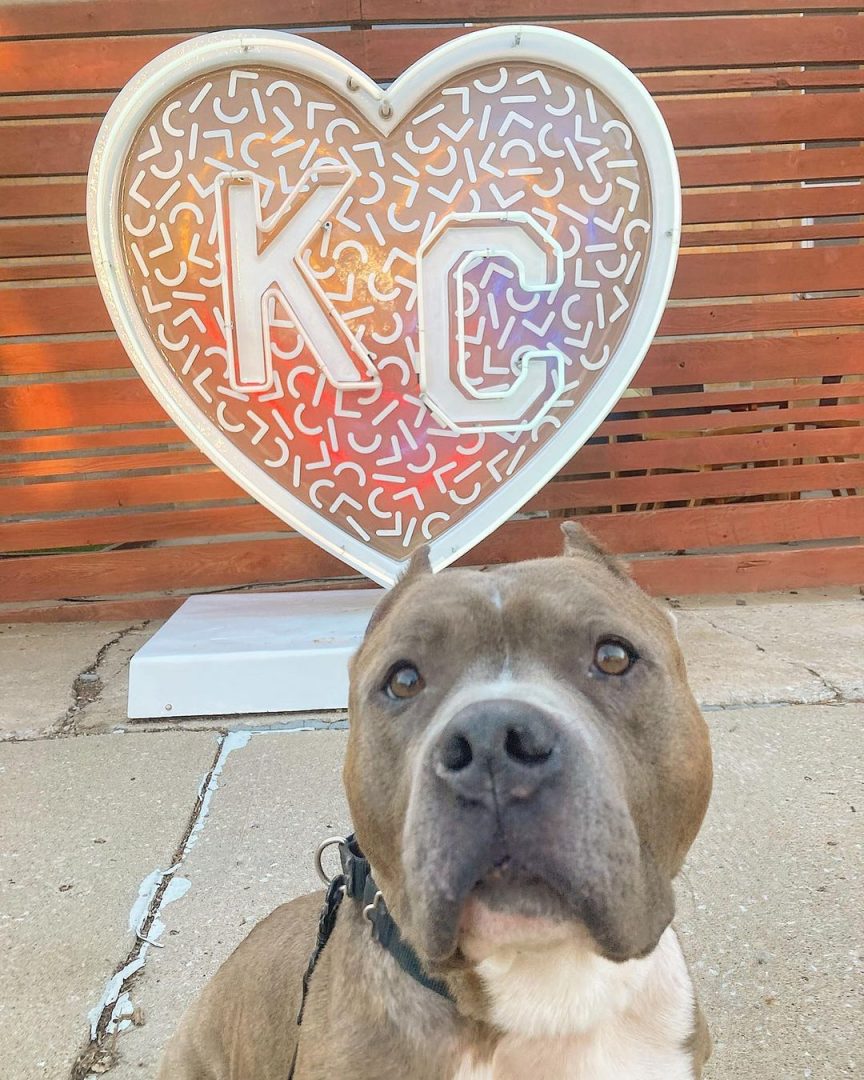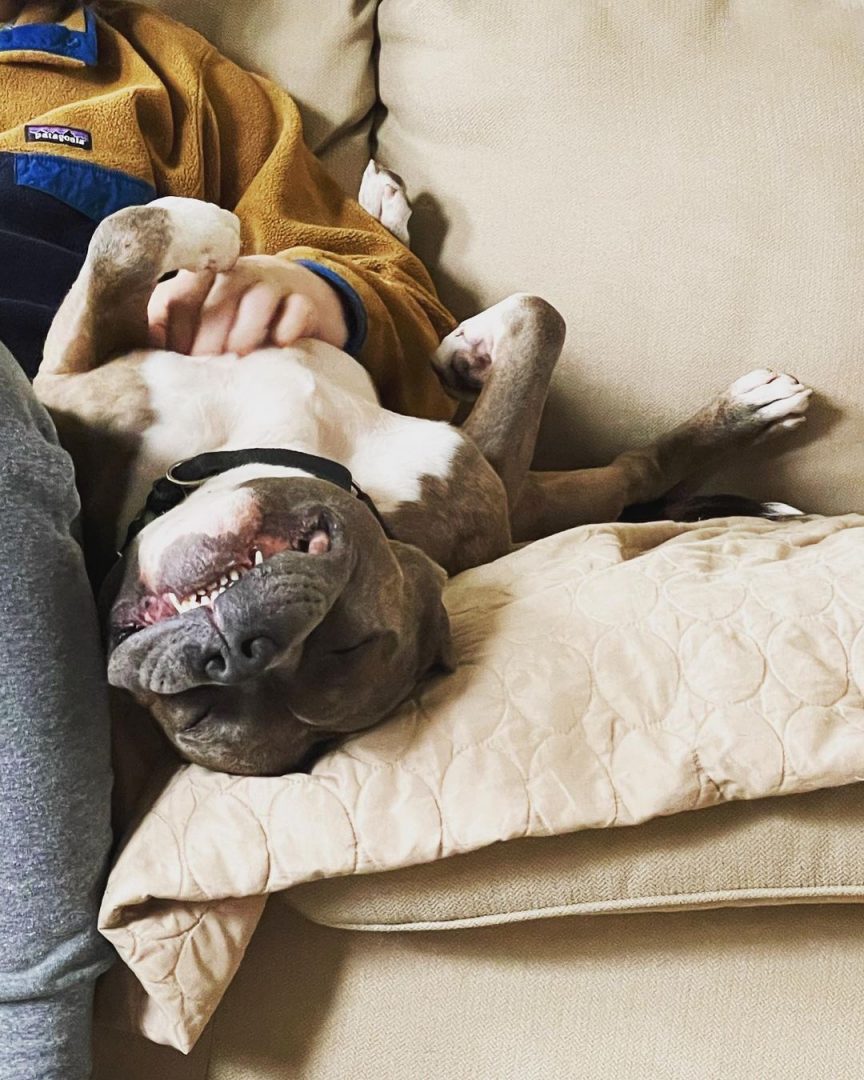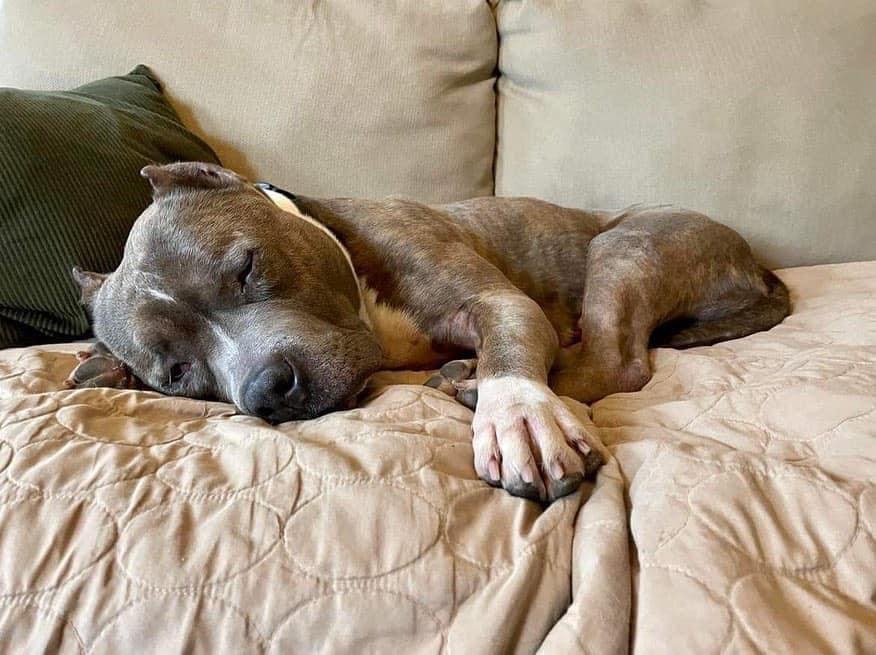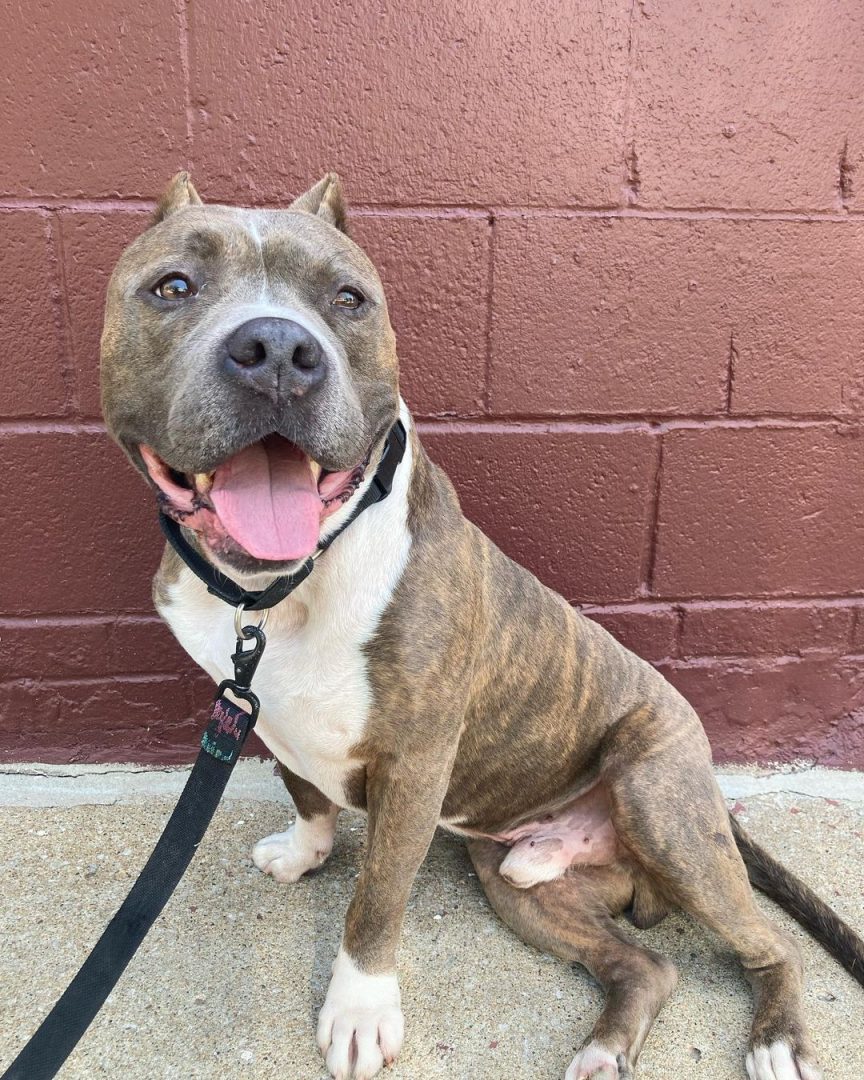Sometimes, beneath their tough exterior and intimidating size lies a gentle soul that only craves love.
This was exactly the case with King Tut – a dog that spent almost 150 days at a shelter in Kansas City, Missouri. Ever since he was surrendered by his owners, all this dangerous-looking Pittie was looking for was someone to be his friend.
What he didn’t know at the time was that one day, his life would change – completely!
Meet King Tut

King Tut hasn’t had an easy past. From the moment he was left at KC Pet Project in Kansas City, Missouri, he coped with severe anxiety and stress.
All this big boi wanted was a loving home and space to move around freely, but the reality was different. Then, Chris, a long-time foster, walked into the shelter one day – and everything changed!
“He had been there for over 150 days. I fell in love. He had such a wiggly little body. With him being so stressed in the kennel, I wanted to get him out as soon as possible,” Chris told The Dodo.
The two bonded right off the bat, which only meant one thing – Tut had just found his new foster dad!
After learning his tragic story, Chris offered to take care of King Tut for as long as he needed. Despite his expectations, he was inclined to help the dog overcome his past. What he didn’t know was that he’d end up fostering the sweetest lovebug!
The Routine

King Tut adapted to his new foster home like the true king he was! Underneath his sturdy exterior was nothing but the gentlest soul craving all the attention from his dad.
Chris was stunned by King Tut’s affectionate nature and the fact that he acted like a real lap dog. The two started doing everything together and even set up their little morning routine.
“We started to do almost everything together. Even little things in my day, like getting ready… I view him as my partner in crime,” says Chris.
It was almost impossible to do anything without King Tut being involved. Whenever Chris was about to brush his hair, get ready, or read a book – Tut was there!
He loved accompanying his foster dad in those little rituals, and the fact that he refused to leave his side, even for one moment, made Chris’ heart melt.
The Sweetest Couch Potato

What King Tut loves the most, though, is taking long, cozy naps on the couch (possibly in his dad’s lap). Despite plenty of other activities that the two do together, this one in particular is his favorite! And, it is safe to say that King Tut is the sweetest couch potato.
The bittersweet moment for the two arrived a few months later. After a long, exciting journey in Chris’ home, King Tut found a new foster, which eventually led to his forever home!
“King Tut went to his new foster this afternoon. If you were at the shelter today and saw a grown man sobbing quietly to himself, that was me,” Chris wrote on Instagram.

Chris was extremely grateful to see King Tut finally embark on a journey to a forever home. At first, he was quite devastated to part ways with his buddy, but he sure couldn’t be happier knowing that his bud got a new chance at life.
“Just got an update from the adopter a few days ago and she said she is crazy in love with him. So he is living a very happy life,” he commented in an Instagram post.
Thanks to his giant-hearted foster dad, King Tut is finally where he was supposed to be this entire time – in a cozy home surrounded by people who’ll never let him go!
Ever wondered why your furry friend curls up in the most peculiar positions, sometimes even snoozing on their back with all four paws in the air? It’s a common sight for many dog owners, sparking curiosity about the reasons behind this adorable behavior. As a seasoned dog enthusiast, you’ve likely observed the various sleeping postures your canine companion adopts, each with its unique charm and quirks.
From playful pups to senior dogs, the way they choose to snooze can reveal fascinating insights into their comfort, security, and overall well-being. As you observe your four-legged buddy catching some Z’s in their signature upside-down pose, you can’t help but wonder what goes on in their furry minds during these moments of vulnerability. Delving into the reasons behind this behavior unveils a deeper connection between your dog’s instincts and their innate need for relaxation.
Understanding Dog Sleeping Positions
The Psychology Behind Canine Postures
Dog sleeping positions are more than just cute poses—they actually reveal a lot about your furry friend’s state of mind. When a dog sleeps on its back, it’s a sign of trust and comfort. This vulnerable position means they feel safe in their environment and with you. On the other hand, a curled-up position shows protection and a desire to conserve body heat. Understanding these postures can help you decipher your dog’s emotions and strengthen your bond.
The Role of Comfort and Security
Your dog’s chosen sleeping position is closely linked to their need for comfort and security. By observing how they sleep, you can gauge the level of relaxation and peace they feel in their surroundings. A dog sleeping with all four paws in the air may seem unconventional, but it’s a clear indicator that they are completely relaxed and carefree. Providing a cozy and secure sleeping environment for your dog can enhance their overall well-being and ensure they get the rest they need to stay happy and healthy.
Why Do Dogs Sleep on Their Backs?
Signal of Trust and Contentment
When a dog snoozes on its back, it’s showcasing trust and contentment. This position exposes their belly—the most vulnerable area. It indicates that your furry friend feels secure, safe, and at ease around you. Your dog is telling you, “I trust you completely,” and it’s a heartwarming display of their bond with you.
Thermoregulation Benefits
Sleeping on their back helps dogs regulate their body temperature. By exposing their less furry underside to the cooler air, dogs can cool down more efficiently. It’s like having a built-in cooling system. So, if you see your pup laying on their back on a hot day, they’re likely trying to beat the heat and stay comfortable.
Stretching and Relaxation
Another reason dogs sleep on their backs is for stretching and relaxation. Just like people, dogs need to stretch their muscles after periods of inactivity. Sleeping in this position allows them to stretch out fully, promoting muscle relaxation and flexibility. It’s their way of unwinding and ensuring they wake up feeling refreshed and ready for another day of play.
Health Implications of Back Sleeping in Dogs
What It Tells You About Your Dog’s Health
Sleeping on their backs can indicate that your dog feels safe and secure. This position suggests they trust their environment and feel comfortable in their surroundings. It also helps with body temperature regulation, especially in warm weather, allowing them to cool down more efficiently.
When to Be Concerned
While back sleeping is usually harmless and even beneficial for most dogs, some health conditions might make this position uncomfortable. If your dog suddenly changes their sleeping habits and avoids sleeping on their back, it could be a sign of discomfort or pain. In such cases, it’s best to consult with your veterinarian to rule out any underlying health issues.
Tips for Ensuring Your Dog’s Comfortable Sleep
Ideal Sleeping Environments
To ensure your dog has a comfortable sleep, it’s crucial to provide the right sleeping environment. Dogs, especially those who prefer sleeping on their backs, appreciate a cozy spot with soft bedding. Opt for a bed or cushion that supports their body well, allowing them to stretch out comfortably. Placing the bed in a quiet and peaceful area of your home can help create a relaxing atmosphere for your furry friend.
Make sure the sleeping area is away from drafts or direct sunlight that could disturb your dog’s rest. Additionally, maintaining a consistent room temperature can contribute to their overall comfort. Remember, creating a safe and inviting sleep environment is key to promoting restful and undisturbed sleep for your canine companion.
When to Consult a Veterinarian
While most dogs sleeping on their backs are simply showing trust and relaxation, sudden changes in their sleeping positions could signal underlying issues. If you notice your dog avoiding sleeping on its back, experiencing difficulty getting comfortable, or showing signs of distress while sleeping, it might be time to consult a veterinarian.
Unusual behaviors during sleep, such as excessive twitching, vocalization, or restlessness, could indicate discomfort or pain. It’s essential to observe your dog’s sleeping habits regularly to detect any changes that might require medical attention. Your veterinarian can help determine if there are any health concerns affecting your dog’s sleep and provide appropriate guidance for their well-being.
Remember, as a responsible dog owner, staying attentive to your dog’s sleeping behaviors can help you address any potential issues promptly, ensuring they have restful and peaceful nights.
Conclusion
So, next time you catch your furry friend sleeping on their back, remember it’s a sign of trust and comfort. Providing them with a cozy sleeping spot can help them feel secure and relaxed. Keep an eye on any sudden changes in their sleeping habits, as it could signal health concerns. By understanding why dogs sleep on their backs, you can create a safe and happy environment for your canine companion. Happy snoozing!
Frequently Asked Questions
Q: What does it mean if a dog sleeps on its back?
A: When a dog sleeps on its back, it signifies trust, comfort, and the need for temperature regulation. This position showcases a sense of security and contentment around their owner, promoting relaxation and muscle flexibility.
Q: How can I create an ideal sleeping environment for my dog?
A: It’s essential to provide a cozy sleeping spot for your dog. Opt for soft bedding in a quiet area away from drafts and direct sunlight. This setup will ensure your dog gets a good night’s sleep in a safe and comfortable environment.
Q: When should I be concerned about my dog’s sleeping habits?
A: If you notice sudden changes in your dog’s sleeping positions or unusual behaviors during sleep, consult a veterinarian promptly. These changes could indicate underlying health issues that need to be addressed for your dog’s well-being.
[no_toc]

Hey there, I’m Janet Brooks, a dog-loving student from California. I’m all about helping pups in need, especially those without homes. Me and my awesome friends work together to give shelter and love to stray dogs. Oh, and I also write blogs about dogs to share helpful info.